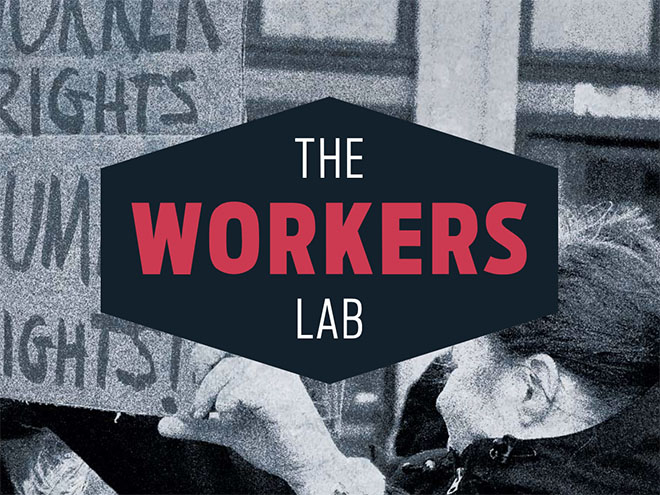
May 21, 2020 - Today, The Workers Lab released the findings of its Workers Strength Fund experiment, the largest ever test on cash transfers to gig workers. Conducted in 2019 and now more timely than ever, the Google Design Sprint-style experiment sought to better understand how financially vulnerable gig workers navigate unexpected expenses and how emergency grants could impact their financial challenges.
This nearly two-year research effort, conducted by Commonwealth, offers early insight into how low-income gig workers navigate unexpected expenses and the short- and long-term financial impact of emergency grants. In many ways, this Workers Strength Fund research has taken on new meaning in the context of COVID-19 and provides several relevant insights that are more important than ever in light of this global health and financial crisis.
“Given the ongoing pandemic, it's clear that cash assistance is important and necessary now more than ever,” says The Workers Lab Leader Adrian Haro. “We need to implement a safety net for our workforce as existing solutions to meet day-to-day financial needs are just not working”.
As studies have shown that less than 40% of Americans can cover an unexpected $1,000 expense, the Workers Strength Fund, led by The Workers Lab and its partners, Commonwealth and Steady, provided 350 $1,000 cash grants to lower-income gig workers in Summer and Fall 2019. Based on learnings from the experiment’s Spring 2019 pre-pilot, the application process for the Workers Strength Fund was streamlined and efficient: users submitted a fund request on the Workers Strength Fund website and were approved within two days. Cash was sent quickly through Paypal or ACH and no documentation of an emergency was required.
The Workers Strength Fund experiment unveiled the following key findings:
- The most common emergency reported by participants was Rent/Utility Bills. Because these workers have volatile incomes, paying for recurring expenses, like rent, that don't fit a traditional definition of an "emergency" can become an emergency in any given month.
- Emergency cash can help people keep their job and/or their home. When offered up to $1000 in emergency cash, the most common emergencies cited by fund recipients were housing related (rent and utilities) followed by auto repairs.
- Just knowing emergency cash assistance is available is a relief for workers. Recipients are deeply grateful to receive this kind of help. The words they use are “relief” and “blessed”.
- It can be tough for potential recipients to believe that help like this exists. Trust in the pilot had to be earned by carefully avoiding the kinds of "quick cash here" marketing that usually pushes high cost debt onto low wage workers.
- Long-term financial improvements can result from the cash grants, but this is far more likely if the cash grants come at a pivotal moment for the recipient and are accompanied by other supports.
These findings come at a monumental time in history as the COVID-19 pandemic is creating increased financial pressure for low-wage workers and contractors across the U.S. who are facing increased challenges in paying rent, utilities, and food bills.
"Designed correctly, emergency cash assistance can be an effective tool in addressing financial vulnerability. Both public and private assistance programs, including the CARES Act stimulus, have been deployed during COVID-19," says Timothy Flacke, co-founder and executive director of Commonwealth. "This research is particularly relevant during the current economic crisis, as we consider the best tools to advance the recovery and financial security of working Americans."
“Steady is honored to have partnered with The Workers Lab on the Workers Strength Fund pilot, which was the largest ever test on emergency cash transfers to gig workers,” says Steady’s Co-Founder & CEO Adam Roseman. “Our lens into the financial lives of our underserved hourly and gig workers shows a consistent inability to weather a financial emergency that can range from an unexpected expense to an illness that prevents work for a worker with no paid time off protections. The emergency cash transfers served as an incredible financial lifeline for these workers and their families in their time of need.”
“The financial lives of low-wage workers are precarious. Earnings are volatile and often insufficient to cover the cost of living. In that context, access to a lump sum of money that is enough to cover a basic emergency is a critical part of the safety net that should exist to support workers,” says Rachel Schneider, Financial Diaries author and Co-founder & CEO of Canary. “It can take months, or even years, for an individual to set aside a $1,000 financial cushion, and it can be wiped out in an instant. We need workplace and portable benefits to bolster what individuals can do on their own.”
“The majority of households in the U.S. face grave financial challenges in the face of unexpected crises--such as COVID-19. The Workers Strength Fund pilot demonstrated that working people benefit from access to emergency funds in addressing short-term crises, relieving the psychological stress associated with such uncertainty. Our findings illustrate how these policies could complement other interventions to address growing inequality and disparities,” says David Weil, Dean and Professor of the Heller School for Social Policy and Management, Brandeis University.
Exactly one year ago on International Workers Day, The Workers Lab launched the pre-pilot of this experiment with the intention of better understanding how providing money to gig platform workers impacts their financial well-being and future. Today, they release findings of the pilot experiment that show support like this is necessary to supporting workers at every level.
About The Workers Lab
The Workers Lab gives new ideas that increase worker power a chance to succeed and flourish through a number of means, including supporting partners and entrepreneurs in the public, private, and nonprofit sectors in experimentation; convening leaders from multiple sectors to develop solutions to the most pressing issues facing workers, and partnering with foundations and investors to double-down on what works. Founded in 2014, The Workers Lab is based in Oakland, California.
PR CONTACT:
Ashley Stelling
855.438.3553
